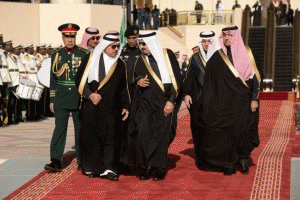Reprinted from Consortium News

King Salman of Saudi Arabia and his entourage arrive to greet President Barack Obama and First Lady Michelle Obama at King Khalid International Airport in Riyadh, Saudi Arabia, Jan. 27, 2015.
(Image by (Official White House Photo by Pete Souza)) Details DMCA
As the Islamic State and Al Qaeda enter a grim competition to see who can kill more civilians around the world, the fate of Western Civilization as we've known it arguably hangs in the balance. It will not take much more terror for the European Union to begin cracking up and for the United States to transform itself into a full-scale surveillance state.
Yet, in the face of this crisis, many of the same people who set us on this road to destruction continue to dominate -- and indeed frame -- the public debate. For instance, Official Washington's neocons still insist on their recipe for "regime change" in countries that they targeted 20 years ago. They also demand a new Cold War with Russia in defense of a corrupt right-wing regime in Ukraine, further destabilizing Europe and disrupting U.S.-Russian cooperation in Syria.
Given the stakes, you might think that someone in a position of power -- or one of the many candidates for U.S. president -- would offer some pragmatic and realistic ideas for addressing this extraordinary threat. But most Republicans -- from Marco Rubio to Carly Fiorina to Ted Cruz -- only offer more of "more of the same," i.e., neocon belligerence on steroids. Arguably, Donald Trump and Rand Paul are exceptions to this particular hysteria, but neither has offered a coherent and comprehensive counter-analysis.
On the Democratic side, frontrunner Hillary Clinton wins praise from the neocon editors of The Washington Post for breaking with President Barack Obama's hesitancy to fully invade Syria. Former Secretary of State Clinton wants an invasion to occupy parts of Syria as a "safe area" and to destroy Syrian (and presumably Russian planes) if they violate her "no-fly zone."
Much like the disastrous U.S. invasions of Iraq and Libya, Clinton and her neocon allies are pitching the invasion of Syria as a humanitarian venture to remove a "brutal dictator" -- in this case, President Bashar al-Assad -- as well as to "destroy" the Islamic State, which Assad's army and its Iranian-Russian allies have also been fighting. Assad's military, Iranian troops and Russian planes have hit other jihadist groups, too, such as Al Qaeda's Nusra Front and Ahrar al-Sham, which receives U.S. weapons as it fights side-by-side with Nusra in the Army of Conquest.
Clinton's strategy likely would protect jihadists except for the Islamic State -- and thus keep hope alive for "regime change" -- explaining why the Post's neocon editors, who were enthusiastic boosters of the Iraq War in 2003, hailed her hawkish approach toward Syria as "laudable."
To Clinton's left, Sen. Bernie Sanders has punted on the issue of what to do in either Syria or the Middle East, failing to offer any thoughtful ideas about what can be done to stabilize the region. He opted instead for a clever but vacuous talking point, arguing that the Saudis and other rich oil sheiks of the Persian Gulf should use their wealth and militaries to bring order to the region, to "get their hands dirty."
The problem is that the Saudis, the Qataris and the Kuwaitis -- along with the Turks -- are a big part of the problem. They have used their considerable wealth to finance and arm Al Qaeda and its various allies and spinoffs, including the Islamic State. Their hands are already very dirty.
Saudi "Hard Power"
What we have seen in the Middle East since the 1980s is Saudi Arabia and other Sunni states creating "hard power" for their regional ambitions by assembling paramilitary forces that are willing and even eager to lash out at "enemies," whether against Shiite rivals or Western powers.
While the wealthy Saudis, Qataris and other pampered princes don't want to become soldiers themselves, they're more than happy to exploit disaffected young Sunnis, turn them into jihadists and unleash them. Al Qaeda (dating back to the anti-Soviet jihad in Afghanistan in the 1980s) and the Islamic State (emerging in resistance to the U.S.-installed Shiite regime in Iraq after 2003) are Saudi Arabia's foot soldiers.
This reality is similar to how the Reagan administration supported right-wing paramilitary forces in Central America during the 1980s, including "death squads" in El Salvador and Guatemala and the drug-tainted "Contras" in Nicaragua. These extremists were willing to do the "dirty work" that Reagan's CIA considered necessary to reverse the tide of leftist revolution in the region, but with "deniability" built in so Official Washington couldn't be directly blamed for the slaughters.
Also, in the 1980s, the Reagan administration's hardliners, including CIA Director William J. Casey, saw the value of using Islamic extremism to undermine the Soviet Union, with its official position of atheism. The CIA and the Saudis worked hand in hand in building the Afghan mujahedeen -- an Islamic fundamentalist movement -- to overthrow the Soviet-backed secular government in Kabul.
The "success" of that strategy included severe harm dealt to the struggling Soviet economy and the eventual ouster (and murder) of the Moscow-backed president, Najibullah. But the strategy also gave rise to the Taliban, which took power and installed a medieval regime, and Al Qaeda, which evolved from the Saudi and other foreign fighters (including Saudi Osama bin Laden) who had flocked to the Afghan jihad.
In effect, the Afghan experience created the modern jihadist movement -- and the Saudis, in particular, understood the value of this paramilitary force to punish governments and political groups that the Saudis and their oil-rich friends considered threats. Officially, Saudi Arabia, Qatar and other Sunni oil states could claim that they weren't behind the terrorists while letting money and arms slip through.
(Note: You can view every article as one long page if you sign up as an Advocate Member, or higher).





